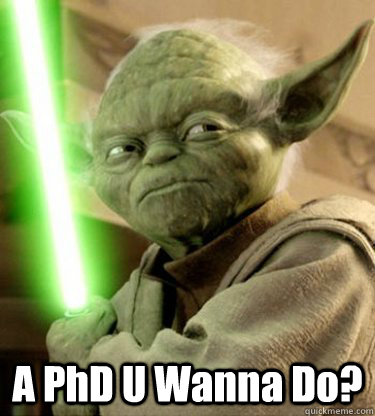 |
| Credit: Me + the Interwebs (QuickMeme) |
As you'd probably expect from a PhD memoir, The PhD Grind describes Philip's experiences throughout the six years he spent at Stanford. It is written in a very personal and captivating way and you can definitely feel the author's pain while going through "the grind", and some of the satisfaction at the later stages when things start working out. The reader is not assumed to know a lot about academia, and especially computer science research, so a lot of the idiosyncrasies of the area are diligently explained. In the interest of full disclosure, the author decided not to stay in academia (I hear he's at Google now), and I could definitely feel a slightly jaded view toward the academic process, even though he denies this in the afterword. But his book is nevertheless extremely realistic and introspective, and I'd definitely recommend that you read it now, before I spoil the pleasure with my comments and musings:
The first thing that struck me was the dysfunctional relationship the author had with his adviser. He openly admits that in the latter part it was more or less an "arranged marriage", and he wasn't willing to switch only because of the large opportunity cost. In fact, he sounds much more excited about his two other committee members, while his adviser is only supposed to "give him the thumbs up". While in the case of Margo, it is admittedly hard not to get excited in her presence, I don't know any of the other characters in real life to judge objectively. Nevertheless, one of the main themes that recurs through the book is that things started working out when Philip was taking things in his own hands. That reminds me of a phrase allegedly repeated by Mike Smith (very approximately my grand-adviser, that is, the adviser of someone who mentored me): "Remember, it is YOUR PhD!". I believe that in a healthy relationship both sides should understand and appreciate that.
I also believe that a "culture fit" is extremely important in an adviser-advisee relationship, and that appears to be missing in Phillip's description of his six years; and he attributes a lot of the misunderstanding to misaligned interests. I'm finding a hard time defining "culture fit" precisely. In general, as Phillip acknowledges, getting a faculty position at a major university is extremely competitive, and one can expect from any group leader to "know how to play the research game" and produce quality research. But different people have different ways of getting there, and those styles are what I refer to as "culture fit". In fact, I believe it is so hard to achieve that it was one of my main criteria when I was choosing a research group myself a few months ago. And since soft terms like that are hard to reason about, my heuristic to measure fit was to look for students similar to me and simply see how happy they looked. I met with quite a few students (7 schools, average 2 groups per school, average 2 students per group), so I claim statistical significance. Interestingly, when I chatted with the happiest students' advisers, they were asking me what areas I found interesting and not trying to force a specific one on me. Just my 5 cents that Mike Smith might have had a point.
The other thing in Phillip's story that didn't match my observations was the perceived adviser figure's narrow interests. He is shown as a very acclaimed, post-tenure professor, who has started his own subfield and only cares about work in that field, even though most of it is admittedly incremental and the big ideas have already sunk in. I've had opportunities to chat with people who have done seminal work in a subfield, and, unless they are already at the emeritus stage, I've always seen the opposite pattern. When someone (usually a young and excited grad student) mentions their old and famous work, there's usually a quick smile, a nod of approval ("you've done your homework, kido") and a just as quick shift of subject to the new project that excites them at that time. For example, when I was chatting with Todd Austin, asking him about his research style, his answer simply was: "I try to come up with a kickass project in a new area every 4 years or so.".
In any case, I might have a few more thoughts to say about Phillip's memoir, but those will wait for a later time, maybe further away from a paper deadline (never?). But seriously, go read it. It's a down-to-earth, brutally honest and very introspective description of what it takes to earn a PhD in computer science and a great example of perseverance and strong will. Well worth two hours of your time. Which, if you are a grad student or, god forbid, an undergrad, isn't worth that much anyways, right? ;)
No comments:
Post a Comment